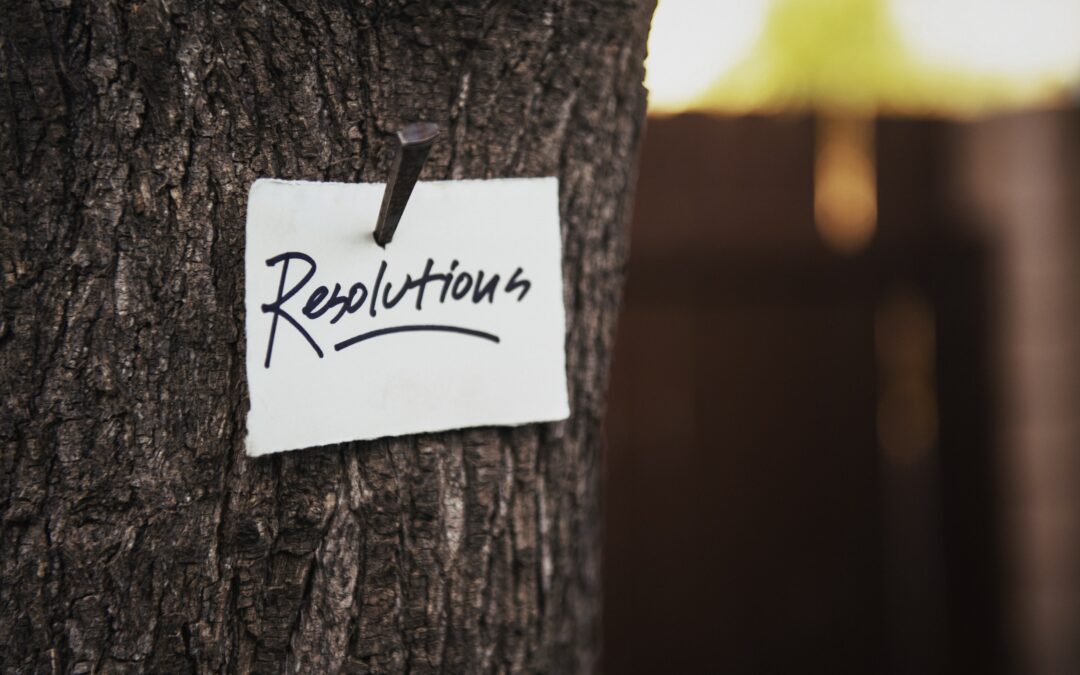It can be an especially challenging time for individuals who are struggling with their mental health, whether experiencing some winter blues, holiday hangover or even fully diagnosed mental illness. You too may be wishing for the new year to bring relief to your symptoms, but actually taking the steps towards improving your mental health can feel overwhelming or even impossible.
How can you create a New Years resolution that you’ll be able to accomplish? Let’s take a common New Years resolution and break it down into something that is more manageable for someone who is struggling with their mental health.
I will walk with my dog 3 times each day (before work, after work and before bed) on the trail near the house. I will check in with myself on Monday, Wednesday and Friday for the first 2 weeks to evaluate my progress.
If you need more help on goal setting, check out our post on Setting SMART-ER Goals.
Now, with this goal, there are a few red flags for someone who may be struggling with their mental health. Be sure to check your goals for these common mistakes.
1. Expecting You’ll Do Something Everyday
Although you may think that you should do things everyday, it is unrealistic, even for the average person, to expect that you will be successful. Life happens, and chances are, you will miss a day.
Instead of setting yourself up for failure by expecting you’ll do something everyday, try:
- Setting a Minimum for Success – how often and/or how long will you accept as a minimum for success? With the exercise goal, maybe 10 minutes is long enough (as this meets the minimum physical activity guidelines), or maybe you set a route close to home and at minimum you complete that route, with the option to add more if you’re so inclined
- Setting an Allowance for Missed Sessions – how many sessions will you allow yourself to miss per week? And what are the allowed reasons (and unacceptable reasons!) for missed sessions? For example, maybe you still keep your goal to walk everyday, but you allow yourself to miss 3 walks per week if you work late, if traffic is bad on your commute, but you won’t allow yourself to skip by hitting snooze or complaining of feeling tired.
2. Not Allowing for Alternatives
If your overall goal is to simply be active, and you hope to achieve this by walking your dog, great! But what happens when you can’t walk your dog? Maybe you’re away from home, the weather is bad, or your dog is sick? Or what if your friend has asked you to go for a hike on the weekend, do you still need to walk your dog 3 times? Planning 1-2 alternative exercises, and allowing for flexibility will set you up to be successful! The key word here is planning. If you can’t walk the dog, what will you do instead? And how much and what type of exercise will you allow as a suitable replacement? Defining these things will make you much more likely to stick with your goal.
3. Lack of Recording Method
Tracking your goals is critical, especially when you’re not feeling your best. Tracking your efforts helps you to feel more accomplished, which will boost your endorphins, making you feel much better! It will also help you to recognize that you’re off track early so you can correct yourself before it’s too late! If you notice you’re missing lots of sessions, it can be an early red flag that your mental health is slipping, and can give you time to respond appropriately to prevent a major slide.
Use a calendar, habit tracker or a simple notebook to track your goal progress and evaluations.
For more ideas on goal setting, take my course Ignite Your Goals. For more tips to help you feel your best, join my online membership program, Radical Wellbeing! There are weekly fitness classes and health education sessions featuring all the latest health research. Don’t miss out!
Are you ready to feel like yourself again? Click on the button below to find out how a health coach can help you feel your best every day.


Recent Comments